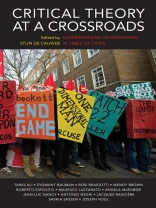We are living in an age of crisis—or an age in which everything is labeled a crisis. Financial, debt, and refugee “crises” have erupted. The word has also been applied to the Arab Spring and its aftermath, Brexit, the 2016 U.S. election, and many other international events. Yet the term has contradictory political and strategic meanings for those challenging power structures and those seeking to preserve them. For critics of the status quo, can the rhetoric of crisis be used to foment urgency around issues like climate change and financialization, or does framing a situation as a “crisis” play into the hands of the existing political order, which then seeks to tighten the leash by creating a state of emergency?
Critical Theory at a Crossroads presents conversations with prominent theorists about the crises that have marked the past years, the protest movements that have risen up in response, and the use of the term in political discourse. Tariq Ali, Rosi Braidotti, Wendy Brown, Maurizio Lazzarato, Angela Mc Robbie, Jean-Luc Nancy, Antonio Negri, Jacques Rancière, Saskia Sassen, and Joseph Vogl offer their views on contemporary challenges and how we might address them, candidly discussing the alternatives that new social movements have offered, alongside an exchange between Zygmunt Bauman and Roberto Esposito on theories of community. Sparring over crucial developments in these past years of catastrophe and the calamity of everyday life under capitalism, they shed light on how crises and the discourse of crisis can both obscure and reveal fundamental aspects of modern societies.
Spis treści
Acknowledgments
Introduction: Resistance in a Time of Crisis, by Stijn De Cauwer
1. A Critical Europe Can Do It! Interview with Rosi Braidotti . Interview conducted by Joost de Bloois
2. We Should be Modest, When It Comes to the Designation of the Possible Subjects of a New Politics: Interview with Jacques Rancière . Interview conducted and translated by Stijn De Cauwer and Gert-Jan Meyntjens
3. The History of the Notion of Crisis: Interview with Joseph Vogl . Interview conducted and translated by Sven Fabré and Arne Vanraes
4. Neoliberalism Against the Promise of Modernity: Interview with Wendy Brown . Interview conducted by Joost de Bloois
5. The European Union Is a Cage: Interview with Antonio Negri . Interview conducted and translated by Stijn De Cauwer and Gert-Jan Meyntjens
6. We Need to Have a Clear Alternative: Interview with Tariq Ali . Interview conducted by Stijn De Cauwer
7. Finance Is an Extractive Sector: Interview with Saskia Sassen . Interview conducted by Tim Christiaens and Massimiliano Simons
8. How to Think a War Machine?: Interview with Maurizio Lazzarato . Interview conducted by Tim Christiaens and Stijn De Cauwer. Translated by Tim Christiaens
9. The Creativity Dispositive: Labor Reform by Stealth: Interview with Angela Mc Robbie . Interview conducted by Stijn De Cauwer, Gert-Jan Meyntjens, and Heidi Peeters
10. The Idea of Crisis: Interview with Jean-Luc Nancy . Interview conducted and translated by Erik Meganck and Evelien Van Beeck
11. Terror and the Rejection of Sense: Interview with Jean-Luc Nancy . Interview conducted and translated by Erik Meganck and Evelien Van Beeck
12. Community in Crisis: A Letter Exchange Between Zygmunt Bauman and Roberto Esposito . Translated by Jolien Paeleman
List of Contributors
Index
O autorze
Antonio Negri (1933–2023) was an Italian philosopher and political activist. He was a prominent figure in the left-wing operaismo movement in the 1960s and ’70s. He is best known for his writings on globalization—particularly the highly influential volume Empire (co-authored with Michael Hardt)—but he also wrote on subjects as various as Vladimir Lenin, Baruch Spinoza, and the Book of Job.












